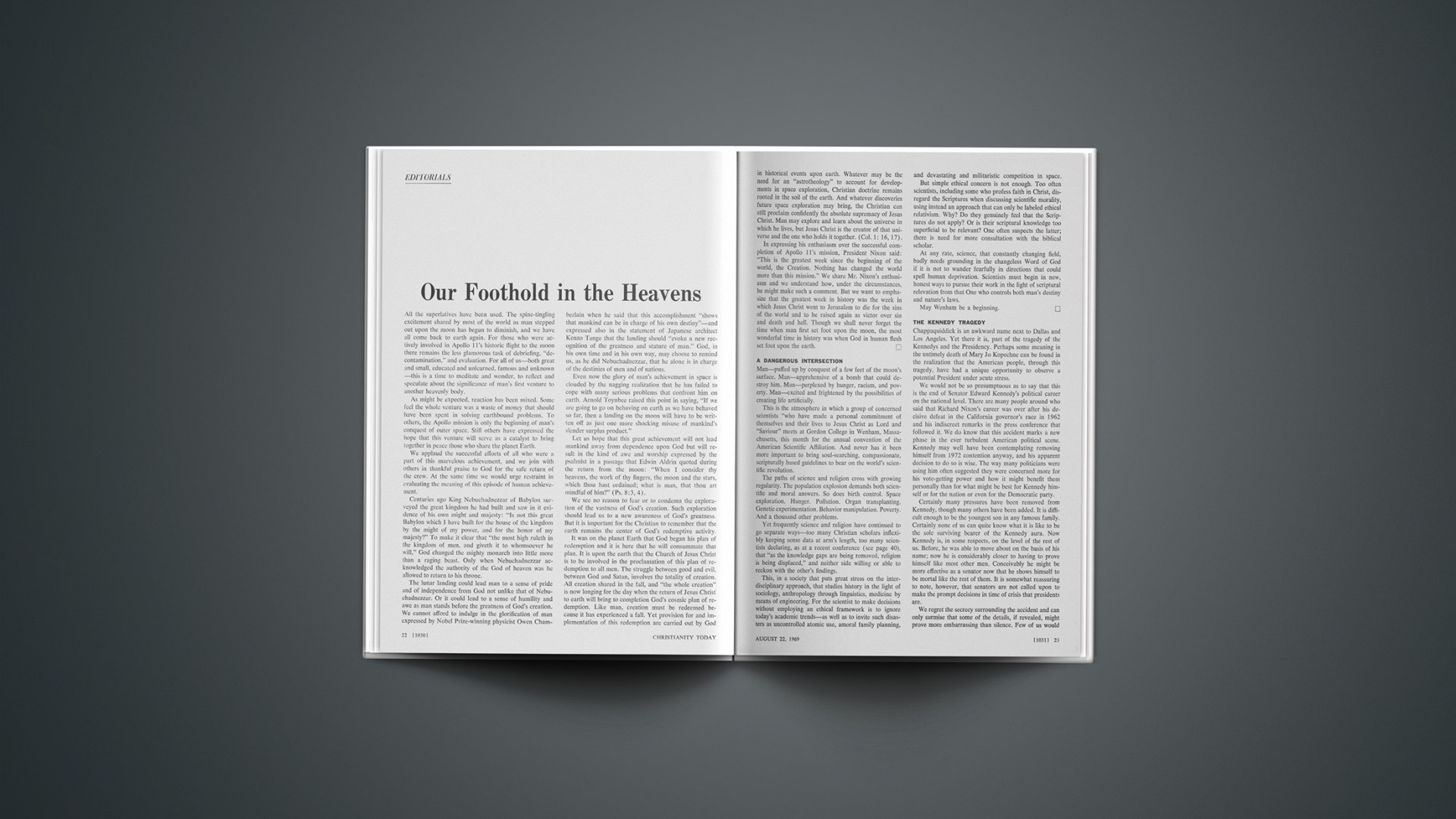All the superlatives have been used. The spine-tingling excitement shared by most of the world as man stepped out upon the moon has begun to diminish, and we have all come back to earth again. For those who were actively involved in Apollo 11’s historic flight to the moon there remains the less glamorous task of debriefing, “decontamination,” and evaluation. For all of us—both great and small, educated and unlearned, famous and unknown—this is a time to meditate and wonder, to reflect and speculate about the significance of man’s first venture to another heavenly body.
As might be expected, reaction has been mixed. Some feel the whole venture was a waste of money that should have been spent in solving earthbound problems. To others, the Apollo mission is only the beginning of man’s conquest of outer space. Still others have expressed the hope that this venture will serve as a catalyst to bring together in peace those who share the planet Earth.
We applaud the successful efforts of all who were a part of this marvelous achievement, and we join with others in thankful praise to God for the safe return of the crew. At the same time we would urge restraint in evaluating the meaning of this episode of human achievement.
Centuries ago King Nebuchadnezzar of Babylon surveyed the great kingdom he had built and saw in it evidence of his own might and majesty: “Is not this great Babylon which I have built for the house of the kingdom by the might of my power, and for the honor of my majesty?” To make it clear that “the most high ruleth in the kingdom of men, and giveth it to whomsoever he will,” God changed the mighty monarch into little more than a raging beast. Only when Nebuchadnezzar acknowledged the authority of the God of heaven was he allowed to return to his throne.
The lunar landing could lead man to a sense of pride and of independence from God not unlike that of Nebuchadnezzar. Or it could lead to a sense of humility and awe as man stands before the greatness of God’s creation. We cannot afford to indulge in the glorification of man expressed by Nobel Prize-winning physicist Owen Chamberlain when he said that this accomplishment “shows that mankind can be in charge of his own destiny”—and expressed also in the statement of Japanese architect Kenzo Tange that the landing should “evoke a new recognition of the greatness and stature of man.” God, in his own time and in his own way, may choose to remind us, as he did Nebuchadnezzar, that he alone is in charge of the destinies of men and of nations.
Even now the glory of man’s achievement in space is clouded by the nagging realization that he has failed to cope with many serious problems that confront him on earth. Arnold Toynbee raised this point in saying, “If we are going to go on behaving on earth as we have behaved so far, then a landing on the moon will have to be written off as just one more shocking misuse of mankind’s slender surplus product.”
Let us hope that this great achievement will not lead mankind away from dependence upon God but will result in the kind of awe and worship expressed by the psalmist in a passage that Edwin Aldrin quoted during the return from the moon: “When I consider thy heavens, the work of thy fingers, the moon and the stars, which thou hast ordained; what is man, that thou art mindful of him?” (Ps. 8:3, 4).
We see no reason to fear or to condemn the exploration of the vastness of God’s creation. Such exploration should lead us to a new awareness of God’s greatness. But it is important for the Christian to remember that the earth remains the center of God’s redemptive activity.
It was on the planet Earth that God began his plan of redemption and it is here that he will consummate that plan. It is upon the earth that the Church of Jesus Christ is to be involved in the proclamation of this plan of redemption to all men. The struggle between good and evil, between God and Satan, involves the totality of creation. All creation shared in the fall, and “the whole creation” is now longing for the day when the return of Jesus Christ’ to earth will bring to completion God’s cosmic plan of redemption. Like man, creation must be redeemed because it has experienced a fall. Yet provision for and implementation of this redemption are carried out by God in historical events upon earth. Whatever may be the need for an “astrotheology” to account for developments in space exploration, Christian doctrine remains rooted in the soil of the eaith. And whatever discoveries future space exploration may bring, the Christian can still proclaim confidently the absolute supremacy of Jesus Christ. Man may explore and learn about the universe in which he lives, but Jesus Christ is the creator of that universe and the one who holds it together. (Col. 1:16, 17).
In expressing his enthusiasm over the successful completion of Apollo 11’s mission, President Nixon said: “This is the greatest week since the beginning of the world, the Creation. Nothing has changed the world more than this mission.” We share Mr. Nixon’s enthusiasm and we understand how, under the circumstances, he might make such a comment. But we want to emphasize that the greatest week in history was the week in which Jesus Christ went to Jerusalem to die for the sins of the world and to be raised again as victor over sin and death and hell. Though we shall never forget the time when man first set foot upon the moon, the most wonderful time in history was when God in human flesh set foot upon the earth.










